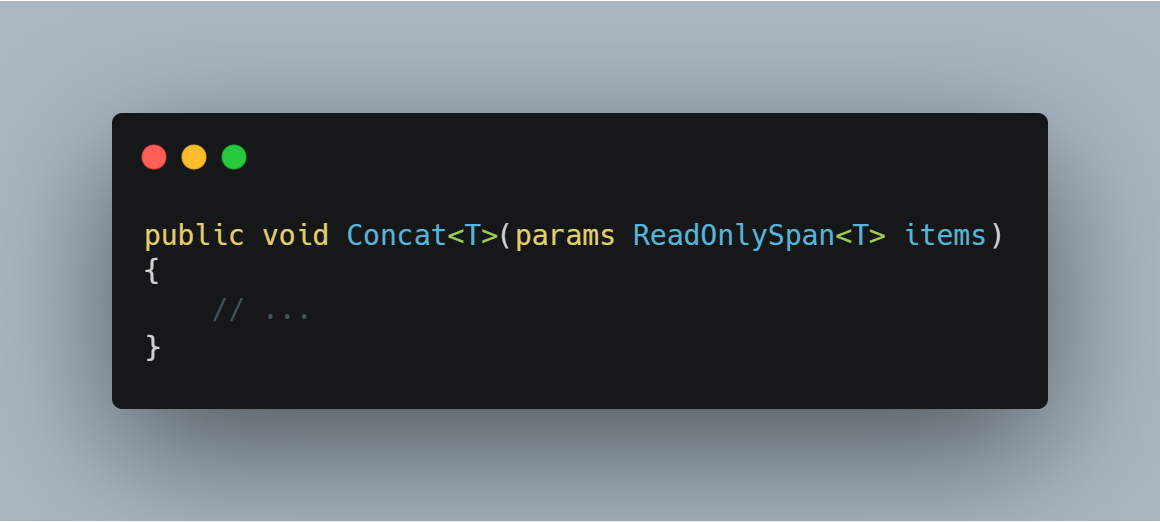C# 13: Use params collections with any recognized collection type
The params modifier in C# has traditionally been associated with array types, allowing methods to accept a variable number of arguments. However, starting with C# 13, you can now use params collections with a variety of collection types, broadening its applicability and making your code even more versatile.
Supported collection types
The params modifier now works with several recognized collection types, including:
System.Span<T>System.ReadOnlySpan<T>- types implementing
System.Collections.Generic.IEnumerable<T>that also have anAddmethod.
Additionally, you can use params with the following system interfaces:
System.Collections.Generic.IEnumerable<T>System.Collections.Generic.IReadOnlyCollection<T>System.Collections.Generic.IReadOnlyList<T>System.Collections.Generic.ICollection<T>System.Collections.Generic.IList<T>
A Practical Example: Using Spans with params
One of the exciting possibilities with this enhancement is the ability to use spans as params parameters. Here’s an example:
public void Concat<T>(params ReadOnlySpan<T> items)
{
for (int i = 0; i < items.Length; i++)
{
Console.Write(items[i]);
Console.Write(" ");
}
Console.WriteLine();
}Code language: C# (cs)In this method, params enables you to pass a variable number of spans into the Concat method. The method processes each span in sequence, demonstrating the enhanced flexibility of the params modifier.
Comparison with C# 12.0
In earlier versions of C#, the params keyword only supported arrays, requiring developers to manually convert other collection types into arrays before passing them to a method that used params. This process added unnecessary boilerplate code, such as creating temporary arrays or calling conversion methods explicitly.
Example without the new feature (Pre-C# 13)
void PrintValues(params int[] values)
{
foreach (var value in values)
{
Console.WriteLine(value);
}
}
var list = new List<int> { 1, 2, 3 };
// Manual conversion to array
PrintValues(list.ToArray());Code language: C# (cs)Example with the new feature (C# 13)
void PrintValues(params IEnumerable<int> values)
{
foreach (var value in values)
{
Console.WriteLine(value);
}
}
var list = new List<int> { 1, 2, 3 };
// No conversion needed
PrintValues(list);Code language: PHP (php)The new feature reduces boilerplate by:
- Eliminating manual conversion – no need to explicitly convert collections like
List<T>orIEnumerable<T>to arrays. - Making code simpler – method calls become cleaner and more readable, directly accepting compatible collection types.
- Improveing maintainability – reduces repetitive and error-prone code, focusing only on the logic instead of handling conversions.
Compiler behavior and overload resolution
The introduction of params collections mean adjustments in compiler behavior, particularly concerning overload resolution. When a method includes a params parameter of a non-array collection type, the compiler evaluates the applicability of both the normal and expanded forms of the method.
Error handling and best practices
Whenever using params, it’s important to adhere to best practices in order to prevent common errors:
- parameter positioning – ensure that the
paramsparameter is the last in the formal parameter list - modifier restrictions – avoid combining
paramswith modifiers such asin,ref, orout - default values – do not assign default values to
paramsparameters, as this is not permitted
For more details you can check out the feature specification.
